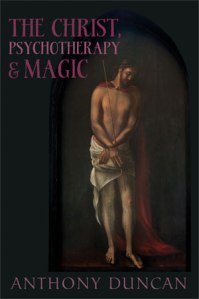The Christ, Psychotherapy and Magic by Anthony Duncan
 In 1533 Cornelius Agrippa remarked – “The outstanding question is this: why is it that although magic originally occupied the pinnacle of excellence in the judgment of all the ancient philosophers and was always held in the highest veneration by those great sages and priests of antiquity, subsequently (from the beginning of the rise of the Catholic Church) it became an object of hatred and suspicion to the holy Fathers, and was as last hissed off the stage by the theologians, condemned by the sacred canons and, in the end, outlawed by the judgment of all laws?”
In 1533 Cornelius Agrippa remarked – “The outstanding question is this: why is it that although magic originally occupied the pinnacle of excellence in the judgment of all the ancient philosophers and was always held in the highest veneration by those great sages and priests of antiquity, subsequently (from the beginning of the rise of the Catholic Church) it became an object of hatred and suspicion to the holy Fathers, and was as last hissed off the stage by the theologians, condemned by the sacred canons and, in the end, outlawed by the judgment of all laws?”Anthony Duncan’s The Christ, Psychotherapy and Magic went a long way to repair the rift and become the first Christian cleric to consider Magic in non-hissing tones for quite some time. Duncan’s study, first published in 1969, is aptly subtitled A Christian Appreciation of Occultism, because the author is willing to suspend his natural inclination to take umbrage and allow himself consult the tenets of occultism with an open mind. Indeed, The Guardian quipped at the time – “Now at least one clergyman has got the point and in this book urges his fellow Christians not to dismiss occultism either as a cranky fad or as ‘a black art’.” With a particular focus on the Qabalah, and without the usual condemnation, he manages to find much common ground between various occult teachings, the Christian perspective, and recent developments in psychotherapy.
The Christ, Psychotherapy and Magic largely came about due to Duncan’s blossoming relationship with leading occultist, Gareth Knight, and his book is still often taught alongside the latter’s Experience of the Inner Worlds. The pair indulged in an intellectual and spiritual engagement that led to an important cross-pollination of their ideas. They both gave lectures at Hawkwood College and continued to correspond until Duncan’s passing in 2003. Indeed much of this book draws on the work of Gareth Knight and his spiritual mentor, Dion Fortune, as Duncan appraises the theology and assumptions of occultists and examines how Christian mysticism coheres with the Tree of Life. In his introduction Duncan summarizes the book thusly:
“The book is in three parts. The first consists of three essays which will seek to establish the origins from which the Qabalistic tradition has sprung. These will discuss Gnosis and Gnosticism, the Qabalah in Judaism, and the relationship between magic and mysticism. My debt, in this part, to the scholars Sydney Spencer and G. G. Scholem is considerable, and will be very obvious to those who are acquainted with their excellent books Mysticism in World Religion and Major Trends in Jewish Mysticism respectively….”
“The second section contains an examination of the Qabalah as it is found in the modern occult tradition. Here too my debt to other writers is considerable, and I have sought to let the occultists speak for themselves as far as possible, and have quoted at length from a number of authorities, chiefly Dion Fortune and Gareth Knight…”
“The third and last section deals with the practical applications of Qabalistic occultism; its meditational techniques and their affinities with modern psychotherapy. The relationship between occult meditation and Christian prayer is examined and a short study is made of ceremonial magic and clairvoyance…”
This is perhaps the text that Anthony Duncan has become most known for and following on from the reissue of his excellent esoteric novel, Faversham’s Dream, it is clear that Duncan is the sort of all-rounder that excels in many forms of writing and scholarship. The book is a compelling study in equal parts history, theology, philosophy, social criticism, anthropology, mysticism, iconography and psychology. Duncan appears equally at home in any of these disciplines although not without courting challenge and controversy.
Some Christians will be outraged by his willingness to consider the occult in a new light and some occultists will be incensed by his findings – but the very attempt is noble. Comparative religious studies were not ‘chic’ at the time of its writing and although there were many Anglicans in the lodge traditions, as well as professed ‘Christian Qabalists,’ the syncretism and sharing hasn’t always been encouraged. What makes this book relevant 40 years on is that Duncan’s lucid and considerate voice can still lead the dialogue between the two traditions and promote more harmonious interchange. Skylight Press is honoured to reintroduce the important and timely work of Anthony Duncan to the world.
The Christ, Psychotherapy and Magic is available from various retail outlets such as Amazon, Amazon UK, or direct from the Skylight Press website.
No comments:
Post a Comment